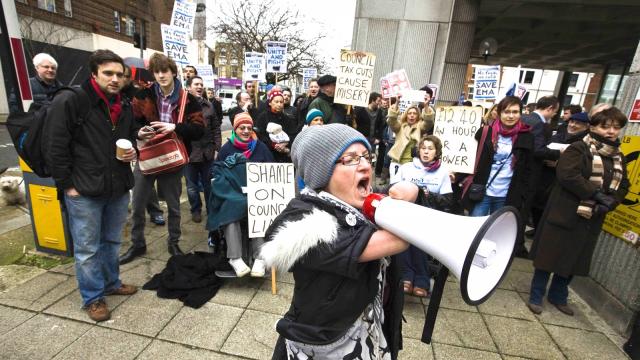
“Essentially neoliberalism is an ideological offensive against the idea that there are alternatives to capitalism, rather than a way of running capitalism itself; because by any rubric, it is a terrible way to run capitalism,” activist and academic David Graeber says in London’s latest Bank of Ideas.
For one week, the Bank of Ideas hosted a Free Education Space asserting the current system is in numerous systemic crises and argued why we need free education in every sense to catalyze alternatives. While using a building that has been abandoned since 1996, the Bank of Ideas provided space for skill-shares, discussions, panel talks and other events. It was also a place where academics, students, activists, workers, locals and others met, organized, created and combined.
Free from Corporate Influence
As many speakers observed, guaranteeing state funding for higher education would remove the corporate grip on academia, particularly from the oil and gas industries. In 2010, when oil/gas maven Baron Browne wrote the report the government cited in its decision to triple tuition fees, he was also their unelected cuts advisor.
One of the talks examined the environmental justice movement, revealing how Browne’s fracking business Cuadrilla takes government money through tax breaks, which he effectively engineered as cuts advisor. The infiltration of education involves not just finance, but academic objectivity. In a broad sense, corporations pay for the research they want and mute the research they don't want.
In the recent “Shale Gas Environmental Summit,” the three academics speaking are all on the payroll of Cuadrilla or other oil firms. Similarly, the scientists supporting the industry were sponsored by oil money. This echoes last years’ news that Shell funded Oxford’s GeoScience lab and has oversight over PhDs.
The education space called to end state violence, which also links to fracking; there has been continued examples including assaults in Barton Moss protection camp and recent Birmingham national student protests. One of the events that covered this theme included questions about the police powers – and abuse of these powers – for a protest legal training session ran by the Legal Defence & Monitoring Group.
Free Education, Free from Inequality
Another core demand within the space was that education needs to be accessible to all, seen as a fundamental right, and freed from privilege and inequality. Lecturer Ciara Doyle from the University of Greenwich questioned the figures showing more ethnic minorities and women are applying to university than ever, which have been celebrated within the mainstream media.
Doyle believes those figures are misleading, especially considering the continuing gender-qualification-pay gap, and sees that gap expanding under universities’ current direction. Doyle argues for more students to reject obedience for critical thinking.
“Many of these students who make up these numbers are now studying for jobs that once did not need degrees, such as caring," she said. "The focus of these course is encouraging rule following and obedience, as this is what the employers want.”
In Doyle’s talk, she made the case that fee hikes courses add another layer of social control, as most graduates have to work in low-paid profession to pay off student debt in today’s jobless economy.
“The £27,000 total fees are effectively an unjust taxation, which will restrict opportunities and restrict life opportunities for young women," Doyle said. "For instance, in the caring profession, they will likely earn £14,000 to £15,000 per year. Effectively, the fees structure is stopping social mobility."
Free from Austerity, Free from Exploitation
Challenging austerity was a dominant theme in the week’s events. Doyle’s talk focused on connecting to the activism of the inspirational group Disabled People Against Cuts, which Doyle is an active member. The end of the Independent Living Fund has meant severely disabled people have all but disappeared from universities,” Doyle tells. “Instead now local authority sends careers at a non negotiable time that can mean the disabled person may have to go to bed as early as 4 p.m.”
Skill-shares and talks united university cleaning staff, who with student support have been pushing for being treated equally to all other staff. PhD students classified as “fractional staff” are paid lower than the London Living Wage are also uniting with activists, students and RMT Tube Workers. The latter have recently shown the power of workers, bringing London to a two-day standstill in a strike opposing the closure of all London Underground ticket offices.
The demand for abolishing fees applies the same economic logic used by activists resisting austerity. Collecting revenues denied due to corporate tax evasion is one way to solve many of these problems.
Free Education for Alternatives
One of the events showing how critical thinking is already being nurtured in British education was a talk by spoken word teacher ‘Pete the Temp’. The poet is one of a handful who has passed a recently piloted Goldsmith University program, allowing qualified artists to teach spoken word in high schools.
Pete the Temp explained how this program ran against the grain of a lot of education, being child-centric rather than top down, with amazing results for students to grow emotionally, in confidence and in academic enthusiasm. This included entertaining the space to sharp student created poems. He said engaging imagination was crucial.
“Creativity is the top ranking need within Maslow’s pyramid. So without it in education, you’re not nurturing the full human,” Pete said.
The End of Capitalism?
One factor uniting education with the fight against austerity and the fight for workers' rights is the problem of debt. Christina Laskaridis, who co-founded the Greek Debt audit, gave a talk about the Greek debt crisis. She explained how financialization and other processes that are not Greece’s fault devastated her country. She proposes an alternative to cancel the illegitimate debts.
In his talk, "Education, Imagination and the Neoliberal Lobotomy," Graeber described how capitalism is hitting three crisis walls: ecological, financial and inequality. He believes capitalism has maintained its dominance until now by attacking the imagination. In one example, he pointed out how the U.K. government’s first austerity measure was to triple tuition fees and diminish academic freedom, making the case that higher education posed a massive threat.
Graeber stressed the importance of space, including the squatted free education space, is crucial for enabling mass mobilization.
“So far, the assault has been successful, but the ruling class now have no way out. We need some sort of radical visionary action as the system now is in freefall,” Graeber said.
3 WAYS TO SHOW YOUR SUPPORT
- Log in to post comments












